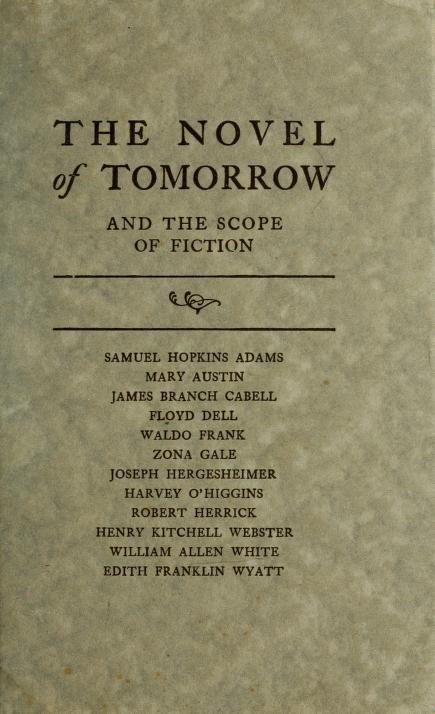“A Note on Alcoves” by James Branch Cabell appeared in The Novel of Tomorrow and the Scope of Fiction Indianapolis: Bobbs-Merrill Company, 1922, pp. 25-35.
The articles in this volume first appeared in a supplement to The New Republic of April 12, 1922, on “The Novel of Tomorrow and the Scope of Fiction.” They were republished by Bobbs-Merrill in book form for the benefit of the Authors’ League Fund for writers in distress.
In “A Note on Alcoves,” Cabell sets out to discuss his personal ideas on “The Form and Scope of the Novel” and so ponders the colorful diversions, or “alcoves” we encounter as we travel through the “gray and monotonous corridors” by which we approach death. Cabell argues that the writer is a diversion-maker, not writing to divert any possible reader, but for himself.
Cabell further claims that all of life is filled with fiction — untruths and censorship — written by businesses, governments and religions, and indeed, “well-nigh every one who anywhere writes prose today, whether it takes the form of a tax return, or a magazine story, or a letter beginning “My dear So-and-So,” is consciously composing fiction.”
To speak of “the scope of fiction” is thus to set boundaries where there can be none. Human memory and human optimism keep us weaving fiction into the story of life on this planet. “The past, the present and the future are thus everywhere presented in the terms of generally pleasure-giving prose fictions: and life is rendered passable by our believing in those which are most to our especial liking.”
Cabell concludes that writing is personal and the novelist will write as his taste and interest dictate; “his rhythms will be such as caress his personal pair of ears.” His own writing bears this out, for in his signature far-ranging manner (and in 10 short pages), Cabell makes reference to World War I (“the war to end all wars”), the sinking of the Titanic (1912), Sinclair Lewis’ Main Street (1920), Homer, St. John ( who wrote the Book of Revelation in Christian scripture), Lenin, Trotsky, Pollyanna (1913) and Marco Polo.
…most of us…approach toward death through gray and monotonous corridors. Besides, one finds a number of colorful alcoves here and there, to be opened by intoxication or venery, by surrender to the invigorating lunacy of herd action, or even by mental concentration upon new dance-steps and the problems of auction bridge. One blunders, indeed, into a rather handsome number of such alcoves which, when entered, temporarily shut out the rigidity and the only exit of the inescapable corridor. And in addition, as we go, all sorts of merry tales are being interchanged about what lies beyond the nearing door and the undertaker’s little black bag.
These are not, though, the only anesthetics. The human maker of fiction furnishes yet other alcoves, whether with beautiful or shocking ideas, with many fancy-clutching toys that may divert the traveler’s mind from dwelling on the tedium of his journey and the ambiguity of its end…
